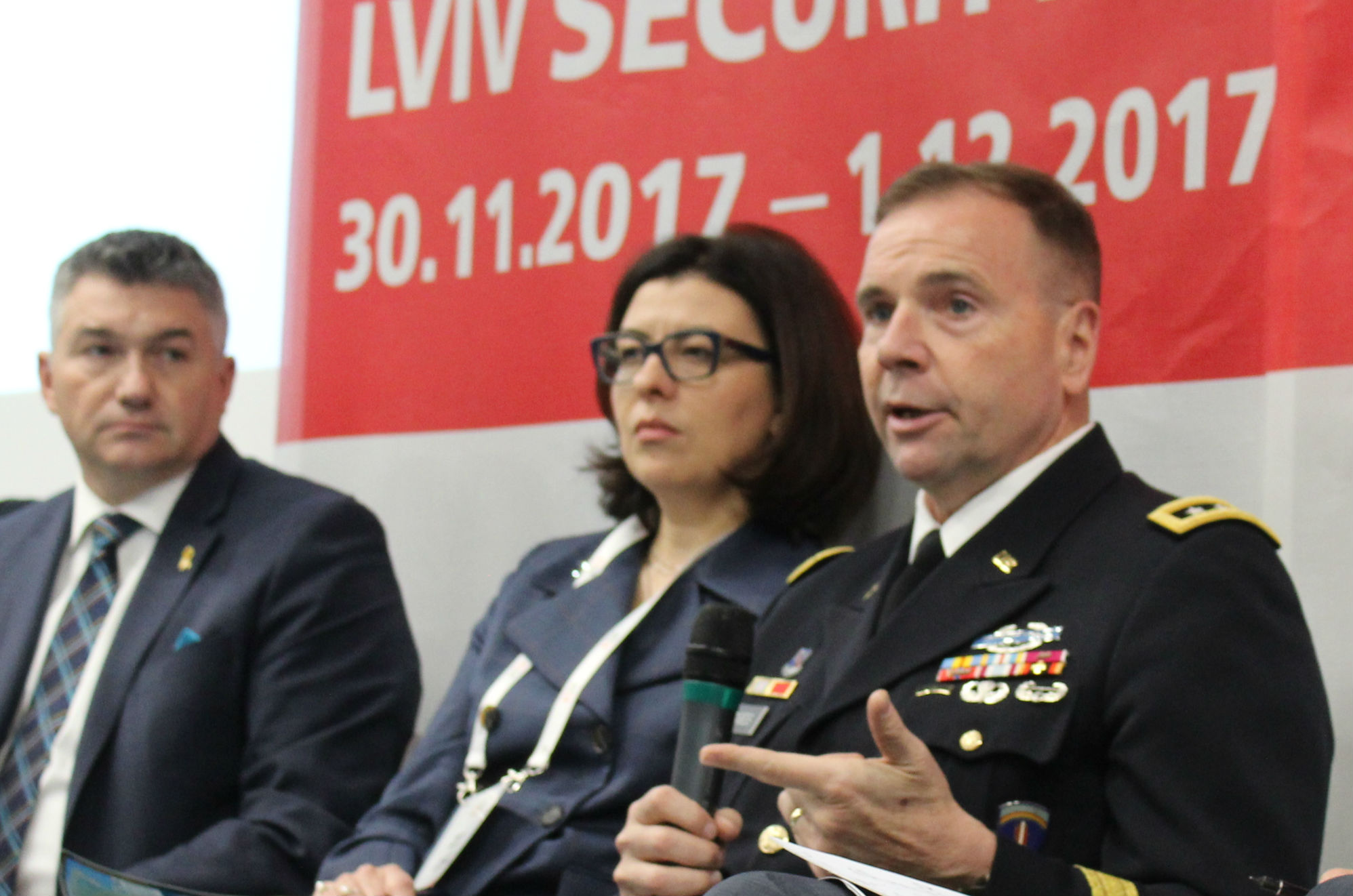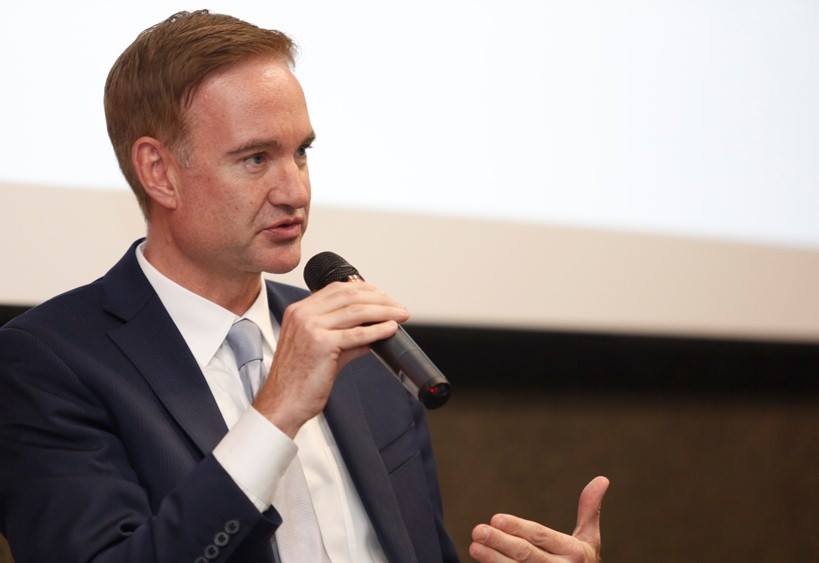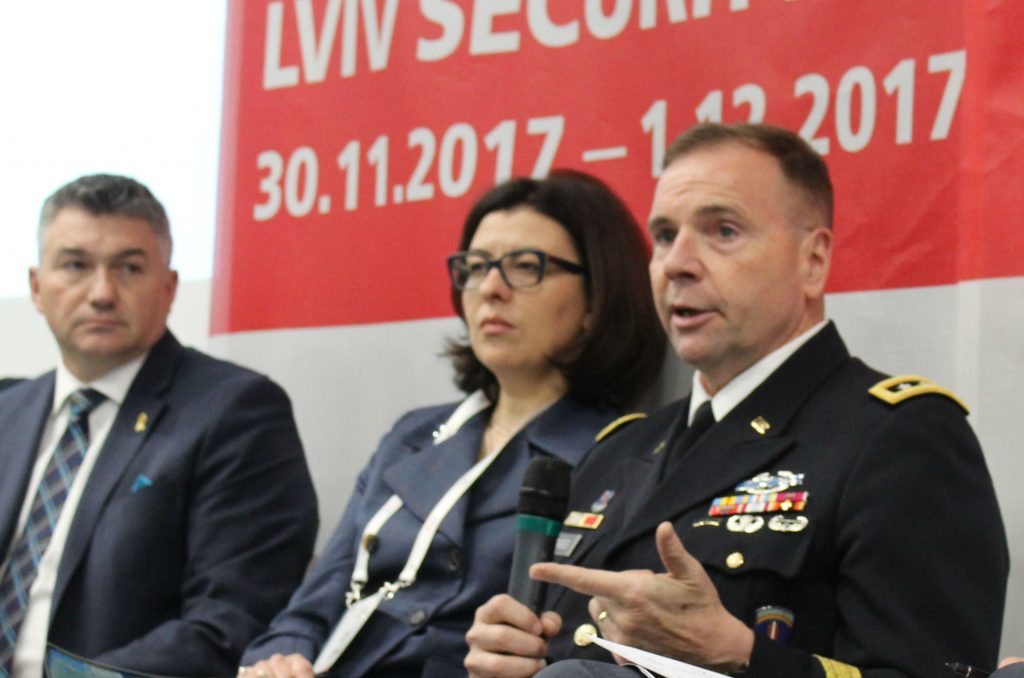 The timing couldn’t have been better. Ukraine’s war is dragging on, Russia is proposing a sham peacekeeping plan, the humanitarian crisis in the east is worsening, and the conflict is receiving increasingly fewer mentions in the international press. In this midst of this dismal news, Ukraine’s deputy speaker of parliament Oksana Syroid organized the Lviv Security Forum to figure a way out. Held November 29-December 1 on the campus of Ukrainian Catholic University in its new state-of-the-art library, the forum was meant to bolster the foreign policy credentials of the Lviv-based Samopomich Party and to convene international experts to discuss what should replace the shaky post-Cold War system.
The timing couldn’t have been better. Ukraine’s war is dragging on, Russia is proposing a sham peacekeeping plan, the humanitarian crisis in the east is worsening, and the conflict is receiving increasingly fewer mentions in the international press. In this midst of this dismal news, Ukraine’s deputy speaker of parliament Oksana Syroid organized the Lviv Security Forum to figure a way out. Held November 29-December 1 on the campus of Ukrainian Catholic University in its new state-of-the-art library, the forum was meant to bolster the foreign policy credentials of the Lviv-based Samopomich Party and to convene international experts to discuss what should replace the shaky post-Cold War system.
Lviv Mayor and head of the Samopomich Party Andriy Sadovyi opened the forum by reminding the crowd of international experts, politicians, and students from the United States and Europe that the twentieth century, a century of atrocities, was not kind to Ukraine. In fact, the city of Lviv was part of six different countries in the last century, he said. Sadovyi said that he’d recently met with the Israeli defense minister and his advice to Sadovyi and Ukraine was simple. “You have to survive,” he said.
The organizers went with the theme of survival, making #survive the hashtag of the forum. However, an emphasis on survival seems behind the times. Ukraine is surviving just fine: since 2014, the country has fought Russia’s proxies to a standstill in the east, professionalized its troops, improved decision-making on the battlefield, and held its ground. Cities that were once considered vulnerable to a hostile takeover like Mariupol have remained in Ukraine’s hands. The real question is how Ukraine can thrive with a never-ending war in its east, rampant corruption everywhere, and a political elite that talks a good game but doesn’t deliver.
Transparency is key, said Lt. General Ben Hodges, the commander of the US Army contingent in Europe, and he pointed to civilian oversight of the US military. “Sunshine kills mold…laws are in place to ensure the transparency of the budget. Every single thing—the cost of the uniform, the cost of boots, the cost of a helmet, everything—there’s an authorization and then there’s an appropriation from Congress that lays out how much can be spent,” he said. And then Congress holds those military leaders accountable for how they spent the funds.
Ukraine’s defense budget—up to six percent of gross domestic product—is shrouded in secrecy, which is wrong and invites corruption and distrust, said Syroid. “This is not the state’s money,” she said. Ukraine needs to increase its defense spending, but it’s impossible to make the case for greater spending if you don’t bother to report back to ordinary citizens how the money is used, she said.
Michael Carpenter, a former US deputy assistant secretary of defense, urged the Ukrainian government to close Ukroboronprom, a state-run collection of defense industry enterprises, which has an “astronomical level of corruption,” he said.

Michael Carpenter, a former US deputy assistant secretary of defense, speaks at the Lviv Security Forum on November 30. Credit: Lviv Security Forum
Carpenter didn’t pull any punches. “This is the essence of how to defeat Russia—you will lose if you do not defeat corruption [in this sector],” he said.
He also said that reform of Ukraine’s defense sector is tied to finally attracting real foreign direct investment, which has been close to zero for the last three years. Carpenter warned that “American companies will not invest a penny in Ukraine as long as Ukroboronprom and the whole sector remain corrupt.”
Other experts agreed but went even further. “The future of Ukraine is in hands of young military officers. Ukraine cannot enter NATO led by Soviet generals,” said Glenn Howard of the Jamestown Foundation.
But some took a different view of Ukraine’s soldiers. Calling them “extremely competent,” Lt. General Hodges said that the United States has benefitted from its interaction with the Ukrainian military, incorporating what Ukraine has learned about Russian tactics and techniques into its own training.
Sanctions on Russia are the right asymmetric tool, Carpenter said, but they’ve been “vastly underutilized.” “It’s time to crank up the volume,” he said, urging the United States to sanction big Russian banks. He called on the United States to continue building up Ukraine’s military capabilities while moving away from structured negotiations, which have had the “wrong people at the table,” he said; he was referring to the Normandy Four talks, which didn’t include the United States. He added that the current round of talks between Russian presidential aide Vladislav Surkov and US Ambassador Kurt Volker aren’t enough.
In the end, Ukraine has to kick its reforms into high gear if it wants to defeat the aggressor. Valbona Zeneli, director of the Black Sea-Eurasia Program at the George C. Marshall European Center for Security Studies, put it well: “Good governance reforms are the best tools to defeat the aggressor.” She’s right.
Melinda Haring is the editor of the UkraineAlert blog at the Atlantic Council. She tweets @melindaharing. Editor’s note: The Atlantic Council’s UkraineAlert was an official media sponsor of the Lviv Security Forum and Haring moderated a panel at the forum.
Image: US Lt. General Ben Hodges (right) speaks at the Lviv Security Forum on November 30. Hodges is joined by Ukraine’s Deputy Speaker of Parliament Oksana Syroid (center) and Canadian Member of Parliament James Bezan (left). Credit: Melinda Haring
